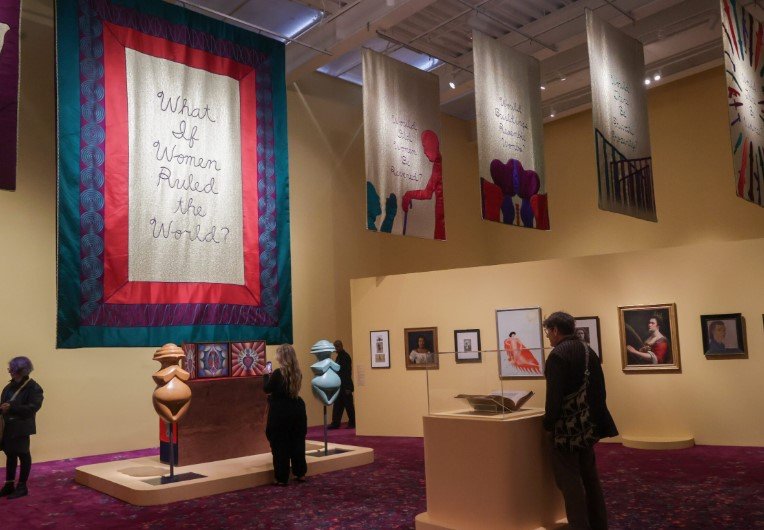A group of over 50 artists and cultural workers has urged feminist icon Judy Chicago and Pussy Riot founder Nadya Tolakonnikova to cancel their upcoming exhibition at the Tel Aviv Museum of Art. The call comes amid accusations that the show ignores women’s rights violations in Gaza and serves to whitewash Israel’s actions.
Background on the Exhibition
The exhibition, titled “What If Women Ruled the World?”, is set to open on September 25, 2025, and run through the end of the year. It features a collaborative quilt with photos and responses from women worldwide, plus a digital component for visitor input.
Chicago started this project years ago with handmade banners shown in fashion and gallery settings. Tolakonnikova contributed early answers to the project’s key questions during its launch at a Miami art institute in 2022.
Gatherings for submissions have happened in cities like Mexico City, Los Angeles, Paris, and New York. The Tel Aviv show marks its latest stop, backed by a Web3 platform for interactive art.
Details of the Open Letter
The letter, signed by more than 50 figures including many based in Israel, labels the exhibition as “artwashing.” It argues that hosting a feminist-themed show in Israel overlooks the ongoing crisis in Gaza.
Signers point to UN data showing over 28,000 women and girls killed in Gaza since October 2023. They claim the museum’s involvement ties the art to a state accused of daily rights abuses.

The letter questions how a project about women’s empowerment can proceed without addressing these issues. It calls for cancellation to avoid hypocrisy in feminist discourse.
Public response has mixed online, with some praising the stance against perceived complicity. Others defend the show as a space for dialogue on global women’s issues.
Responses from Involved Parties
Chicago has not yet commented publicly on the letter. Tolakonnikova stated she is no longer involved in decisions about the work or its venues.
The Tel Aviv Museum of Art stands firm on proceeding. Its director expressed shared horror at Gaza’s devastation but rejected cancellation as an ineffective response.
She argued that art can foster understanding amid conflict. The museum views the exhibition as a platform for diverse voices on feminism.
This stance echoes past debates in the art world over cultural boycotts. Similar calls have targeted events in regions with human rights concerns.
Broader Context in Art and Activism
Artwashing claims often arise when cultural institutions face scrutiny over political ties. In recent years, artists have boycotted shows linked to controversial sponsors or locations.
For example, protests have hit museums accepting funds from arms makers or fossil fuel companies. The Gaza conflict has sparked boycotts of Israeli cultural events worldwide.
Chicago’s career focuses on feminist themes, from her famous “Dinner Party” installation to recent retrospectives. Tolakonnikova’s activism with Pussy Riot targets authoritarianism and women’s rights.
Their collaboration aims to imagine a world led by women, but critics say the Tel Aviv setting undermines that vision. Supporters argue art should transcend borders to promote change.
Key elements of the controversy include:
- Feminist integrity: Does the show ignore real-world women’s suffering?
- Cultural boycotts: Are they effective tools for activism?
- Artist responsibility: Should creators control where their work appears?
Impact on the Art World
This dispute highlights tensions between art, politics, and ethics. It could influence future exhibitions in conflict zones.
Museums worldwide watch closely, as similar letters have led to cancellations or modifications in the past. For instance, a 2024 New York show faced protests over its funding sources.
Attendance and public reception remain uncertain. The digital quilt might still grow, allowing global input despite the backlash.
Experts predict more such debates as artists navigate polarized global issues. This case adds to discussions on how feminism intersects with geopolitics.
Related Events and Statistics
Recent art controversies provide context for this situation. Here’s a table summarizing key similar incidents:
| Year | Event | Location | Outcome |
|---|---|---|---|
| 2023 | Protest against Zionist-themed talk | New York Jewish Museum | Event proceeded with disruptions |
| 2024 | Cancellation of Gaza mourning performance | Whitney Museum | Show halted due to content concerns |
| 2025 | Boycott call for fashion-art collab | Paris gallery | Partial withdrawal by artists |
These examples show a pattern of activism targeting cultural events. UN reports note rising women’s rights violations in conflict areas, with Gaza seeing a sharp increase in 2025.
Art sales data from major auctions indicate growing buyer interest in politically charged works. Feminist art, like Chicago’s, has seen values rise by 15 percent in the last year.
The controversy might boost awareness of the exhibition, drawing more visitors or online engagement. It underscores the power of art in sparking tough conversations.
As this story develops, share your thoughts in the comments below. What do you think about cultural boycotts in art? Spread the word by sharing this article with friends interested in feminism and global issues.
